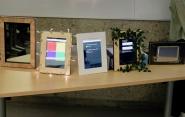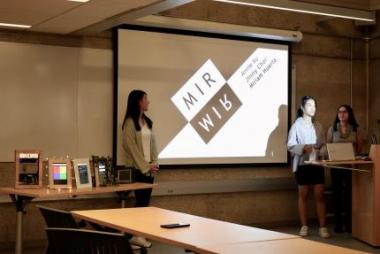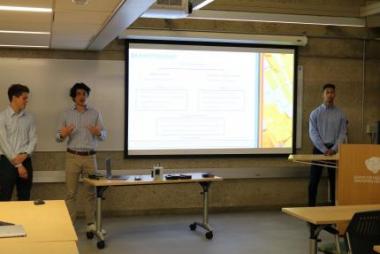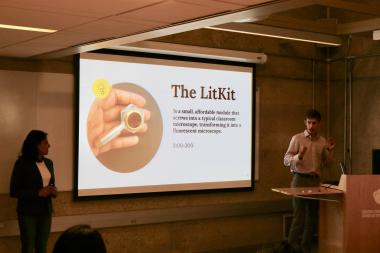More Innovations from the Summer Design Fellows

It was, per usual, another productive summer at the Center for Engineering Innovation and Design (CEID). A big part of this is due to the 2019 cohort of the Yale School of Engineering & Applied Science's Summer Design Fellows.
The eight students comprised three teams of two to three members. Working out of the CEID’s John Klingenstein '50 Design Lab, the teams brainstormed, designed and built their innovations. Here’s a look at the teams and what they made:
 Mirrim - Taking the art of journaling into the 21st century, the team of Miriam Huerta ‘22, Jinny Choi ‘22, and Annie Xu ‘22 have created a simple way for users to self-reflect in a positive and constructive way. Working with the Yale Center for Emotional Intelligence, the students developed a system that involves a high-tech mirror, speech-to-text and other features. Users start the day reciting an affirmation, and learn to recognize their moods with a meter. Eventually they develop the skills to better regulate their thoughts and emotions.
Mirrim - Taking the art of journaling into the 21st century, the team of Miriam Huerta ‘22, Jinny Choi ‘22, and Annie Xu ‘22 have created a simple way for users to self-reflect in a positive and constructive way. Working with the Yale Center for Emotional Intelligence, the students developed a system that involves a high-tech mirror, speech-to-text and other features. Users start the day reciting an affirmation, and learn to recognize their moods with a meter. Eventually they develop the skills to better regulate their thoughts and emotions.
 IV Pump Alarm Management System - Studies show that patient alarms in hospitals sound off up to 40 times per hour. It makes it hard for patients to rest and it leads to burnout from staff. It’s known as “alarm fatigue” and it’s one of the top complaints among hospital patients and nurses. The team of Matt Albritton ‘22, KJ Richmond ‘19, and Scotty Parajón ‘22 came up with a system that aims to change that. They created a device that attaches to a pump that silently sends alarm data to a hospital server, which then aggregates the alarms and then sends them to a workflow manager in the hospital.
IV Pump Alarm Management System - Studies show that patient alarms in hospitals sound off up to 40 times per hour. It makes it hard for patients to rest and it leads to burnout from staff. It’s known as “alarm fatigue” and it’s one of the top complaints among hospital patients and nurses. The team of Matt Albritton ‘22, KJ Richmond ‘19, and Scotty Parajón ‘22 came up with a system that aims to change that. They created a device that attaches to a pump that silently sends alarm data to a hospital server, which then aggregates the alarms and then sends them to a workflow manager in the hospital.
 LitKit - The design of the typical high school microscope hasn’t changed in some 50 years. Looking through its lens, biology looks a little lifeless. Enter LitKit, a “novel, transformative biology tool for classrooms” created by the team of Anusha Manglik ‘22 and Will Polsky ‘21. Thanks to fluorescent microscopy, we can see cells move, change, grow, and interact with their environment. The problem is that the typical fluorescent microscope costs about $10,000, and it's unlikely you'll find it in most classrooms. The LitKit team, though, developed a small module that can be connected to classroom microscope and turn it into a fluorescent microscope. And it only costs about $200.
LitKit - The design of the typical high school microscope hasn’t changed in some 50 years. Looking through its lens, biology looks a little lifeless. Enter LitKit, a “novel, transformative biology tool for classrooms” created by the team of Anusha Manglik ‘22 and Will Polsky ‘21. Thanks to fluorescent microscopy, we can see cells move, change, grow, and interact with their environment. The problem is that the typical fluorescent microscope costs about $10,000, and it's unlikely you'll find it in most classrooms. The LitKit team, though, developed a small module that can be connected to classroom microscope and turn it into a fluorescent microscope. And it only costs about $200.

